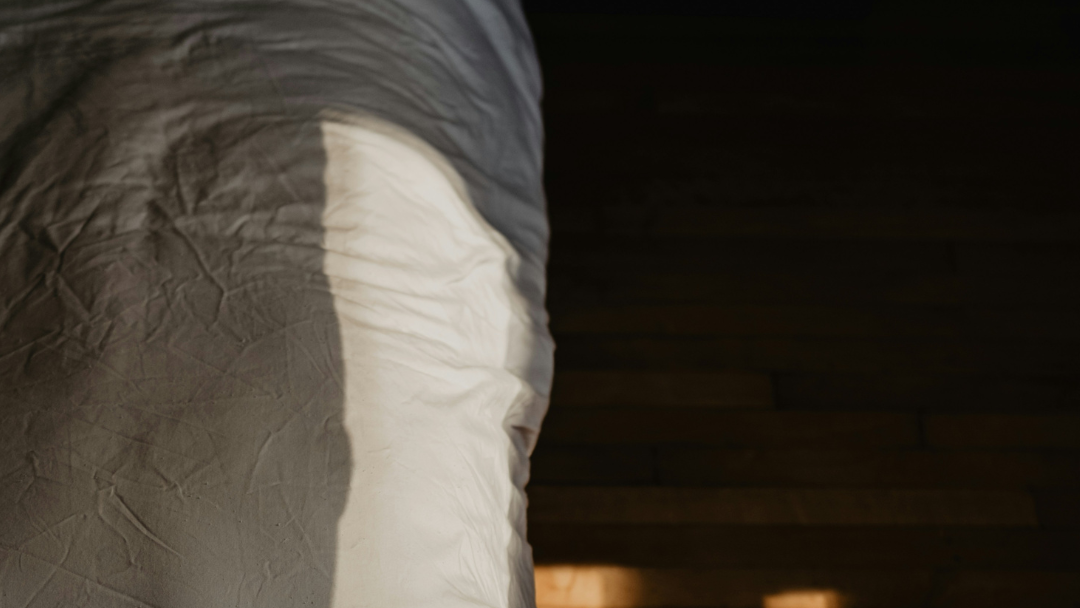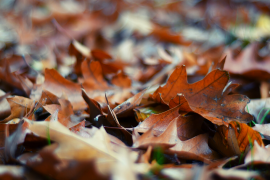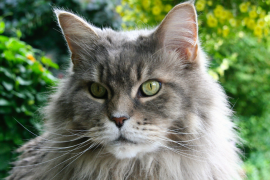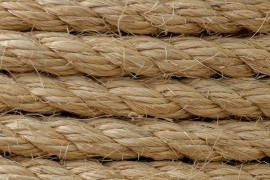I have been walking long enough for people to see me coming and cross the road. My hair, when I touch it, is stiff, the skin beneath my nose raw. Snot still comes long after I’ve cried myself dry, and I wipe, over and over, wincing. I have nowhere to go, but I can’t go home. I haven’t told anyone what happened, so she would still be there.
We’d closed on the house that spring. It needed some work, but we’d both fallen in love with its bay windows, fingers reaching for each other’s hands when, on the tour, the agent had flung wide the shutters. Past the sagging electrical wires and crooked fuse box, there was a vast and perfect tree. It had angled across a wrought iron fence, friendly head flush with acid green leaves. It was the only tree on the block, and we took its tilt like an invitation, an entreaty to stay and keep it company.
She hadn’t been climbing the tree when it happened. She was just on a ladder, not even a very tall one. “There’s a cocoon,” she’d said, eyes bright as she’d lugged the metal steps from the garage. She’d pointed like a child, head swiveling between the speck hanging from the eave and my face. Checking to make sure I saw it, the tiny miracle we were hosting.
I hadn’t really cared, wasn’t even particularly nice about it. I’d wanted to get inside, to put the groceries away and pee and check my email. As if her wonder, the gold-spun thing inside her that turned mistakes into laughter and wrong turns into adventures, was a tedious chore. I left her in the driveway and loaded my shoulders with grocery bags and didn’t even run when I heard the unfamiliar noise, strangely hollow, like a wet, distant drum.
She’d insisted she was okay. She’d hit her head, but it wasn’t bad. Look, she wasn’t bleeding. She wasn’t dizzy; she didn’t even have a headache. She was just going to lie down for a minute, then she’d come back out. It was Friday. She wanted to make cookies.
We didn’t have health insurance, and I’d still clung to that childish disillusion: Sure, bad things happened to people, but not to us. When tragedy stepped hungry from the trees, there would always be someone to run less quickly, to be overtaken while we sprinted on, young and beautiful, as if that made us invincible. So I’d let her go. When I’d come in half an hour later with a glass of water, she’d looked like she could be sleeping.
I stop behind a strip center, the bare back of the connected shops deserted, peeling like the skim of boiled milk. I can’t find a hose or spigot along the wall, so I sit in the shade of the dumpsters and rest my head against a stack of splintered palettes. Bent, rusting nails peek out from the cheap wood. I can’t remember the last time I had a tetanus shot. I imagine raking a nail across my forearm, waiting for my jaw to stiffen. I lick my split bottom lip with a sandpaper tongue and close my eyes.
When I wake, it is dark, and I am not alone. Warm breath rustles my hair, and I hear the scrape of claws on the wood palettes behind me. A coyote, I think, or a stray dog. I hold myself still, even as a wet nose snuffles inside my ear. I wonder if the creature is considering biting me. I wonder if it has sharp teeth.
There is a whisper, the breath of a ghost sidling past.
A cat stands before me, her gaze direct. I get the sense that I have been expected. Am late, even. Her coat is a confusion of color and pattern, orange and toffee spots cut through with chocolate stripes. Her eyes are framed with dark liner, bright peridot irises winking in contrast. She is heavily pregnant.
Still holding my gaze, she walks to my side and butts her forehead against my shoulder, rubbing down the length of my arm with her brow bone, her cheek, her chin. It feels so nice, the downy softness, her warmth, that I nearly begin crying again.
“I can’t take care of you,” I tell her. She ignores me. A sign, I think, of good judgment.
The sun rises, a soufflé of rubbery American cheese, expanding along the roof of the strip center. For the first time since I began walking, I hear my stomach growl.
The cat unfurls like ribbon from a spool, arching her narrow back. My side is cold where she’d been pressed against me. She catches my gaze with her gem-cut eyes, and I understand: her kittens are coming soon.
I walk along the line of dumpsters until I find one full of cardboard, stamped with the names of book publishers, the boxes only sporadically broken down. I spot a well-proportioned square, its walls thick and clean and sturdy with tape. I lift the cat, and she curls inside.
I do not know where I am, so when I spot a woman stepping outside the back door of the pizza place to light up, I walk a few paces toward her. Across her forehead, her otherwise grey hair is stained the same yellow as her teeth. She watches me through a steady stream of smoke.
I ask if she can point me in the direction of the highway, and she raises a long-nailed finger. And the date? August twenty-third. A Friday.
I have been gone a week.
She tells me to hold on and dips back inside. When she cracks the door again, she tosses a plastic bag towards me. There are two bottles of water, the plastic so flimsy the bottles bend in my hands, a sleeve of barbecue potato chips, and a calzone, still warm.
My mouth tingles, too dry for saliva to form. I’ve been stealing sips from hoses and public bathroom taps, but it’s been a while since I last had a drink. I open a bottle and take three small sips, slowly, spaced out, wary of my tender stomach. When I keep the water down, I unwrap the calzone and stare at it, waiting for hunger to come. I know I need to eat, so I leave the food in my hand, figuring my brain will come around to the idea eventually. With my other hand, I form a leaky bowl, offering the cat water. Her strange tongue tickles as she laps my palm clean. I pick off a few pieces of calzone crust and drop them in the box, then we start for the highway. I walk steadily, so the cat can sleep.
It takes me two hours to reach the highway, then another three to recognize the name of an exit and finish the calzone. When I sit on a bench to rest, I immediately throw up the food, like a mother jackal. The cat eats it, and I am not disgusted. It is the most natural thing in the world.
Before sunset on the fourth day, my feet find our street. I nearly turn back when I see our house. I am so close to what is inside, and what I must do. My hands shake, but I move forward. I have done my running; it is time to dig.
She had loved the knot of a yard, tied like a kerchief around the house’s neck. She used to putter along the fence, clucking at her plants like a chicken. In the kitchen, knees muddy, fingers clasped around a sweating long-necked lager, she’d tell me about her dramatic fig tree, bell-flowered jalapeños, and caterpillars, always caterpillars. “They’re eating all my fennel!” she’d proclaimed proudly. The yard danced with her butterflies.
In the dusk, the plants are bowed, eyes cast down in mourning. I set the cardboard box on its side on the back porch, take a beach towel from the garage to spread at its mouth. I can’t go inside yet, and I don’t want the cat to find her. “I’ll get you something to eat soon, okay?” The cat blinks slowly at me before pawing the towel into a nest.
I find her shovel, the one she’d used to dig the hole for her fig sapling, a spindly stick of a thing she’d insisted on calling “Miss Figgy.” I thrust the metal into the ground and exhale; it is so much stronger than I’d imagined. Sturdy and dense and entirely indifferent to the fact that I need to break it with my meager tool and taffy arms, need to somehow tear the earth into a space big enough to contain the person I love.
By the time the sun is sunk, I have a shallow gash, about six feet long and three feet wide. The cat nudges my calf, and I know I need to go inside. Holding my shirt against my nose, I slip the key in the lock and force myself over the threshold. There are sardines in the cupboard, a remnant of the time she’d tried to coax a raccoon out of the neighbors’ attic. I snatch the cans, breath held, and hurtle back into the inky yard.
I arrange the fish into an oily jenga tower and watch the cat topple it with greedy bites, a tiny Godzilla. She watches me over her supper, and leaves two meaty bodies for me to share. I have been a vegetarian since high school, but I press the sardines into my mouth, chewing them to a paste. I open my mouth to let her sniff; satisfied, she moves back to her nest. My hands are screaming, blisters furious beneath the salty oil. I rub them on the seat of my pants before taking up the shovel again.
The moon is high by the time my body has clapped out a rhythm. My hands thrust, feet kick, hips twist, back dips. It’s a loathsome waltz, my hitching tears a dirge, keeping time. When the shovel breaks, I begin clawing the dirt with my hands. I scratch at the walls of the hole until my nails bleed, the soil stinging as it breaks the dam of skin. There is dirt in my eyes, tears painting my face with muddy tributaries down my neck, into my bra. Dirt crunches between my teeth, and I chew on my sobs like chunky peanut butter.
When the wall of earth stands taller than I do, I sit down heavily. Lying on my back, snot leaking from my nose, I lift my eyes, burning from the tears, to the sky. I can’t see the moon, but it’s not a bad view. The plants will know she’s here, I figure. They’ll grow their roots down deep to say hello, wrap themselves around her waist and weave a crown along her skull. She will nourish generations, and they will keep her bones safe.
When it is time, I put on her garden gloves and rip at the hem of my shirt, tying the rag over my nose and mouth. I leave the back door open; I don’t want the cat to see my shame, but she has a right to know. Probably already does. It will be easier if the door is open, anyway.
There is nothing familiar about the smell, even though it is entirely hers. It is sweet, and it is thick, and I know it will follow me now, like a shadow.
Our bedroom is on the first floor. There’s a bigger one upstairs, but it looks over the backyard, its windows two perfect rectangles. Nothing like the magic of the three-sided bay, which floods the tiny upstairs office and first-floor bedroom with light. I’d rolled my eyes dramatically at its barely there closet, the cramped en-suite that wasn’t big enough for us to brush our teeth at the same time. I even kept my clothes upstairs, often bathing in the spacious shower. But I came to her every night in the postage stamp bedroom, wrapping my arms around her waist and humming when she’d gaze out the window and say, “Don’t you love it? Look. We can see the sky.”
The thing on our bed is not my wife. It is shiny and wet, a round, red gummy bear whose mouth is gaping and skin is slipping and I make a sound that is so inhuman I check to make sure my hands are not paws before I stuff them through my torn-shirt mask and between my cracked lips to muffle the roar.
I cannot touch her. She is wet and peeling and more fragile in death than I can process. Coughing against the smell, I untuck the sheet and fold it over her. Whatever is seeping out of her soaks through the cotton, and I quickly pull up the corners of the fitted sheet, then the mattress protector, and grip the two sides in fistfuls. Grimacing, I pull.
She falls to the floor, landing with a sound like a tomato hitting pavement, and I wretch. For so long that my knees begin to shake, I stay knelt on the floor. When the cat finds me, she licks my face. I meet her eyes and open my mouth to try to tell her that the wrong one of us died, but she just keeps licking. Her tongue stings, and I focus on its texture, tiny knives brushing my cheeks, my forehead, my eyelids.
Struggling to my feet, I continue, almost sobbing with relief when I see that the mattress protector is keeping all of her inside.
At the edge of the grave, I stop. There is no good way. I push until she goes over. The sound is worse than when she dropped from the bed, and I fall again on hands and knees, spitting out the salty stuff that is pooling in my mouth. I cough until the bile is gone.
I have to force myself down there. I wince as I roll her to her back and straighten her legs, cup my gloved hands beneath her head and angle it towards the sky. She never kept her phone in her pocket, but I pat her sides just in case. I leave her wedding ring.
When it is done and the earth is holding her, I lie on top of where she lies and whisper, “I’m sorry, I’m sorry, I’m sorry.”
I hear the cry from inside the house, and this time, I run. I stumble up the stairs, so covered in dirt from the dig that I leave a trail of filth behind me, like a snail.
The cat is in my closet, nestled on top of a sweater I don’t recognize, a relic of my life before. Something reddish and shiny has leaked out of her, and she’s licking between her legs. I don’t know what to do, so I sit before her.
“I’m here,” I tell her. All I can do is hope that’s enough.
MC STEVENSON (she/her) is a queer writer from Texas. Her fiction debut appeared in Cream City Review and was nominated for the Pushcart Prize. She works with authors and an independent bookstore from her home in Austin, where she lives with her partner and their pets. You can find her online at @merricatmerricat.
Like what you’re reading?Get new stories, sports musings, or book reviews sent to your inbox. Drop your email below to start >>>
NEW book release AWRY by duncan b. barlow. Order the book of stories of which Brian Evenson calls “meticulous and precise, painful and surprising.”
GET THE BOOK



